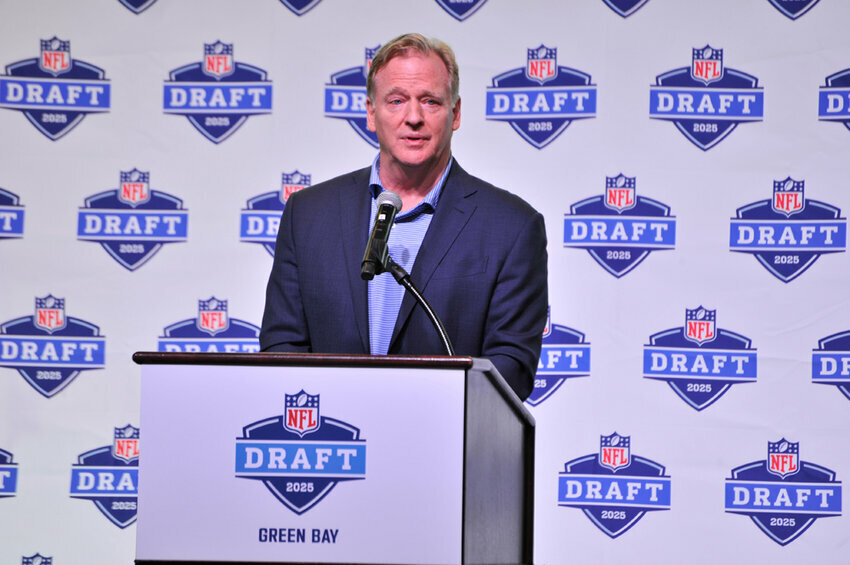Roger Goodell: NFL Hasn’t Had ‘Formal Discussion’ About Expanding to 18-Game Regular Season…..
Roger Goodell: NFL Hasn’t Had ‘Formal Discussion’ About Expanding to 18-Game Regular Season…..

In the world of professional sports, the balance between maintaining competitive integrity, ensuring player health, and satisfying fans is an ongoing challenge for league commissioners and governing bodies. This is particularly true for the National Football League (NFL), where every decision, from rule changes to schedule adjustments, carries far-reaching consequences for players, teams, and fans alike.
The question of whether the NFL will expand its regular season from 17 games to 18 has been a subject of considerable debate in recent years. It is a matter that touches on a variety of issues, including player safety, revenue generation, competitive fairness, and fan demand for more football action. With the current NFL regular season having undergone significant changes in recent years, including the 17-game format introduced in the 2021 season, many are wondering if the league is considering another expansion to 18 games.
In a recent interview, NFL Commissioner Roger Goodell addressed this topic, stating that the league had not yet had a “formal discussion” about expanding to an 18-game regular season. His comments, however, sparked further conversation about what the future of the NFL might look like, and what impact such an expansion could have on the game, players, teams, and fans. This article takes an in-depth look at the context of Goodell’s remarks, the factors surrounding the potential expansion, and what it could mean for the future of the NFL.
### The Current State of the NFL Regular Season
The NFL’s regular season has seen several changes over the years, particularly in terms of the number of games teams play during the regular season. Historically, the NFL’s regular season consisted of 14 games, a format that lasted until 1960. From 1961 to 1977, the regular season expanded to 16 games, which remained the standard until the 2021 season. This 16-game schedule was considered by many to be the traditional format, with each team facing off against each other once in a home and away format, with additional games against teams from the same division.
However, in March 2021, the NFL owners and the NFL Players Association (NFLPA) reached a new collective bargaining agreement (CBA), which included the historic expansion of the regular season to 17 games. This marked the first time in the NFL’s history that teams would play more than 16 games in a regular season.
The decision to extend the season to 17 games was met with a mix of reactions. For fans, it meant one more week of regular-season football to enjoy, expanding the scope of matchups, rivalries, and drama that made the NFL so popular. From a financial standpoint, it also meant more opportunities for the league to generate revenue through television rights, sponsorships, and game-day ticket sales.
However, there were concerns, particularly regarding the impact on player safety. NFL players, who already endure one of the most physically demanding schedules in professional sports, expressed concern about the increased risk of injury over an additional game. Injuries have always been a constant issue in the NFL, and expanding the schedule raised fears of further straining players, particularly in high-contact positions such as running backs, linebackers, and offensive linemen.
Despite these concerns, the expansion to 17 games was ultimately approved, and it’s important to note that the 17-game schedule was not implemented in a vacuum. The NFL also implemented changes to the preseason format, reducing it from four games to three in order to help alleviate some of the added strain on players. The introduction of the 17-game season, while still fresh in the minds of many, has now brought us to the next logical question: Could the NFL move to 18 games?
### Roger Goodell’s Remarks: No Formal Discussion About 18-Game Schedule
During a recent interview, NFL Commissioner Roger Goodell addressed the speculation about a potential expansion to 18 games in the regular season. According to Goodell, the NFL has not yet had any “formal discussion” regarding the move to 18 games, though he did acknowledge that it has been a topic of conversation within the league.
In his statement, Goodell pointed out that the 17-game schedule was still relatively new and that the league was focused on monitoring its effects on player safety, the competitiveness of the game, and the overall experience for fans. The Commissioner stressed that the league’s primary concern would be ensuring that the integrity of the sport is maintained, with careful consideration given to the health and well-being of the players.
Goodell’s comments underscore the complexity of the issue. Expanding the regular season to 18 games would require balancing various interests—players’ health, financial goals, fan demand for more games, and the quality of the product on the field. The decision would not only involve a simple vote by NFL owners but also require consultation with the NFL Players Association (NFLPA) and an in-depth review of data regarding injuries and the long-term effects of a longer season.
At the heart of this issue is player safety. With players already at risk for significant injuries during the 17-game regular season, the prospect of adding another game to the schedule raises questions about how much wear and tear the human body can take. Injuries are a regular feature of the NFL, with players suffering from everything from concussions to torn ligaments, fractures, and muscle strains.
In the past, Goodell has been vocal about the league’s commitment to improving player safety, particularly in response to growing concerns about concussions and their long-term impact on players’ health. The idea of adding another game to the schedule may appear to contradict these efforts, making it all the more important for the NFL to carefully consider the potential consequences before taking any formal action.
### Potential Benefits of Expanding to 18 Games
Despite the concerns surrounding player safety, there are numerous potential benefits to expanding the regular season to 18 games, particularly from a financial and fan engagement perspective.
#### 1. **Increased Revenue Streams**
The NFL is a multi-billion-dollar industry, and additional regular-season games would present a significant opportunity to generate more revenue. This could come from increased television deals, sponsorships, ticket sales, and merchandise sales. The addition of a game would also likely result in more content for media partners, which could drive up the price of broadcasting rights for networks.
The 18-game schedule would also increase the number of opportunities for the league to showcase its stars in prime-time television slots, creating even more opportunities for fans to watch high-profile matchups.
#### 2. **Fan Demand for More Football**
There is no denying that NFL fans are hungry for more football. Given the immense popularity of the league, particularly in the United States, the demand for more content is a driving force behind the potential expansion. The extra game could bring more excitement and drama to the regular season, allowing fans to witness even more intense matchups, late-season playoff implications, and rising storylines as the season progresses.
An 18-game schedule would also allow the NFL to create more marquee games and rivalries, increasing the league’s ability to attract attention and fill stadiums. The NFL has historically enjoyed strong attendance numbers, and adding an additional game could help sustain this trend.
#### 3. **More Opportunities for Player Records and Achievements**
An extended regular season would give players more opportunities to break records, further cementing the legacies of NFL greats. In a league where individual performance is heavily scrutinized, extra games would provide additional opportunities for players to rack up impressive stats, whether it be in terms of rushing yards, passing touchdowns, or defensive statistics.
### Concerns Around Player Safety and Wellness
While the financial incentives for expanding the season to 18 games are compelling, the health of the players remains a significant concern. NFL players already face considerable physical strain over the course of a 17-game regular season. Adding another game would only increase the chances of injuries, especially in a high-contact sport like football.
The increased risk of injury would be a point of contention for the NFL Players Association (NFLPA), which has already voiced concerns about player safety and the long-term health consequences of a longer season. In response to the 17-game schedule, the NFLPA has called for increased protections for players, including better concussion protocols, improved injury prevention programs, and more recovery time during the season.
The NFL has made strides in improving safety measures, such as modifying tackling techniques, introducing mandatory helmet technology, and making changes to the way the game is played. However, the prospect of a longer regular season would require even more attention to the players’ health and wellness, including the possibility of expanding the roster size or introducing more recovery periods between games.
### What’s Next for the NFL?
For now, the NFL remains focused on monitoring the impact of the 17-game regular season and has not engaged in formal discussions about expanding to 18 games. However, as the league looks to the future, it is likely that the idea will continue to be debated. The league must carefully weigh the financial benefits of more games against the risks to player safety and the potential long-term effects on the game itself.
As with any major decision, the NFL will need to consult with the NFLPA, conduct thorough research on player health, and take into account fan sentiment before taking the next step. Whether the league ultimately expands to 18 games or sticks with 17, one thing is clear: the landscape of the NFL and the way fans experience the game will continue to evolve.
For now, the question remains: Will the NFL expand to 18 games in the future, or is the 17-game season here to stay? Only time will tell, but Roger Goodell’s remarks suggest that there is still much to consider before making a formal decision. For fans, it’s a waiting game as they continue to enjoy the excitement of the NFL’s regular season, no matter how many games it lasts.













Post Comment